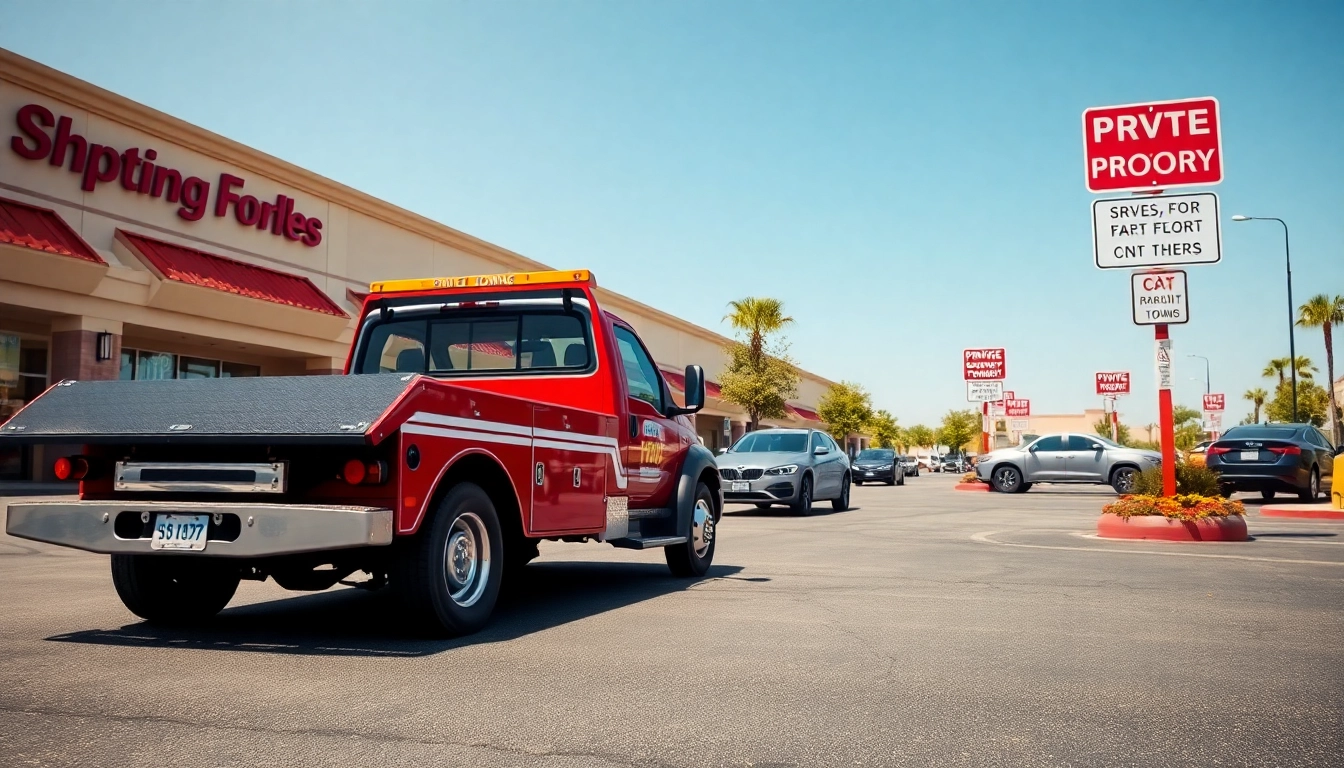What is Private Property Towing?
Definition and Purpose
Private property towing refers to the removal of vehicles parked without authorization on private property. This service is primarily utilized by property owners, businesses, and homeowners to manage the parking of unauthorized vehicles. The main objective is to ensure that designated parking areas are available for authorized users, maintaining order and accessibility. The need for private property towing arises from various scenarios where vehicles may obstruct access, violate parking regulations, or pose liabilities to property owners.
Common Scenarios for Towing
Various circumstances can lead to private property towing, including:
- Vehicles parked in reserved spots without permission.
- Long-term abandoned vehicles that can become eyesores or hazardous.
- Occupants of vehicles causing disturbances or engaging in illegal activities.
- Commercial vehicles using residential parking unnecessarily.
Understanding these common scenarios helps property owners make informed decisions about when to initiate towing services. Knowledge of local laws and regulations governing towing practices is equally crucial in preventing legal repercussions.
Legal Framework for Towing
The legal framework surrounding private property towing can vary significantly between jurisdictions, but common legal principles generally include:
- Authorization: A towing company must have express written authorization from the property owner or an appointed agent to remove a vehicle.
- Signage Requirements: Properties must display clearly visible signs indicating the towing policy. This often includes details about unauthorized vehicles and associated penalties.
- Notification Protocols: In some areas, property owners must notify local authorities before a vehicle can be towed.
Failing to adhere to these legal requirements can result in fines, liability for damages, or recovery actions against property owners or towing companies. For comprehensive information, local laws should always be consulted, especially since the legal landscape can change frequently.
The Process of Private Property Towing
How Towing Companies Operate
When it comes to private property towing, companies operate based on established protocols and the agreements set forth by property owners. Generally, the operational process includes:
- Assessment: Towing companies assess a situation to determine if towing is warranted.
- Authorization Verification: They confirm that they have the proper authorization from the property owner.
- Signage Inspection: They ensure requisite signage is in place, as required by law.
- Vehicle Removal: After confirming these factors, the vehicle is legally towed and taken to the designated impound yard.
Understanding how towing companies function helps property owners choose reputable services that comply with local regulations.
Steps to Request a Tow
To request a tow from private property, property owners should follow these steps:
- Identify the Vehicle: Clearly identify the vehicle needing towing, including details such as the make, model, and license plate number.
- Check for Legal Compliance: Ensure that the vehicle is parked in violation of property rules and that proper signage is displayed.
- Contact a Towing Company: Reach out to a licensed towing service with experience in private property towing.
- Provide Necessary Documentation: Supply any required documents, such as proof of property ownership or the towing authorization.
Following these steps ensures a proper and efficient towing process while minimizing potential legal disputes.
Documentation Required for Towing
Proper documentation is essential to facilitate the towing process and protect the rights of both the property owner and the towing service. Key documents often include:
- Proof of Ownership: Documentation that verifies the property owner’s authority to tow vehicles, such as a property deed or lease agreement.
- Towing Agreement: A pre-established agreement with the towing company outlining responsibilities, fees, and procedures.
- Incident Report: A written record detailing the circumstances surrounding the towing request, noting any violations by the vehicle owner.
Having these documents prepared can streamline the towing process and aid in resolving any disputes that may arise afterward.
Your Rights as a Property Owner or Vehicle Owner
Understanding Towing Laws
As a property owner, understanding local towing laws is critical to ensuring that your rights are upheld while also acknowledging the rights of vehicle owners. Key rights include:
- Right to Tow: Property owners have the right to enforce towing for violations of parking regulations to protect their property.
- Right to Due Process: Vehicle owners are entitled to a fair process before their vehicles can be towed and have the right to contest the towing.
- Right to Information: Property owners must communicate their towing policies effectively to avoid misunderstandings.
Being informed about these rights helps property owners navigate the complex landscape of vehicle management and towing effectively.
Rights of Vehicle Owners
Vehicle owners also have rights when it comes to private property towing. Understanding these rights is critical for both parties involved. Vehicle owners are entitled to:
- Notification: They should receive adequate notice regarding the towing of their vehicle.
- Right to Retrieve: Once a vehicle is towed, owners have the right to retrieve it promptly and without excessive fees.
- Dispute Process: In the event of a disagreement, vehicle owners can dispute the validity of the towing action.
Awareness of these principles ensures that vehicle owners can defend their rights when necessary.
Liabilities and Responsibilities
Both property owners and towing companies bear specific liabilities and responsibilities. Property owners must ensure that:
- The appropriate signage is visible and correctly worded as per local regulations.
- They provide fair policies that comply with state laws.
- The towing company operates ethically and legally.
On the other hand, towing companies must take care to:
- Conduct towing operations based on legal and ethical standards.
- Communicate fees and procedures to vehicle owners upon towing.
- Maintain accurate records of all towing actions and agreements.
Understanding these facets helps in minimizing risks and managing expectations between all involved parties.
Best Practices for Private Property Management
Signage and Notification Requirements
Effective signage is paramount in the realm of private property towing. Best practices involve:
- Utilizing clear and conspicuous signs that are easily readable from various angles.
- Including necessary information such as potential towing fees, contact numbers for towing companies, and any other vital details regarding unauthorized parking policies.
- Regularly reviewing and maintaining signage to ensure compliance with evolving legal standards.
Proper signage not only deters unauthorized parking but also protects the property owner from potential legal disputes.
Regular Communication with Towing Companies
Maintaining open lines of communication with towing companies is essential for managing private property effectively. Property managers should:
- Establish clear operational protocols with the towing service, including how to handle special situations.
- Schedule periodic reviews of the contract to ensure alignment with current requirements and operations.
- Provide feedback and collaborate with towing companies to address ongoing challenges.
Effective communication fosters a proactive approach to managing towing scenarios, minimizing conflicts and ensuring effective resolution of issues.
Dealing with Disputes and Complaints
Even with careful management, disputes regarding towing may arise. Best practices for addressing complaints include:
- Establishing a clear process for raising concerns, ensuring they are documented and addressed swiftly.
- Utilizing mediation or negotiation tactics if required to resolve disputes amicably.
- Keeping a detailed record of incidents, communications, and resolutions to reference in future disputes.
Handling disputes professionally not only protects the interests of property owners but also builds trust with vehicle owners, enhancing community goodwill.
Conclusion: Ensuring Effective Private Property Towing
Recap of Key Points
Understanding the intricacies of Private Property Towing can significantly enhance how property owners manage their spaces effectively. From legal requirements and operational processes to understanding rights and best practices, a well-informed approach can facilitate smoother interactions and fewer conflicts.
Future Trends in Towing Services
The towing industry is continuously evolving, with emerging trends likely to shape its future. These may include:
- The introduction of digital platforms for reporting and managing towing incidents.
- Increased focus on environmentally sustainable towing practices.
- Improvements in technology for tracking and managing vehicles throughout the towing process.
Staying updated with these trends will position property owners and towing companies to respond adeptly to changing conditions.
Contacting Local Authorities for Assistance
When in doubt, reaching out to local authorities or legal experts specializing in towing regulations can offer invaluable guidance. Ensuring compliance with local laws not only protects property owners but also supports the rights of vehicle owners, fostering a fair towing environment for all stakeholders.



